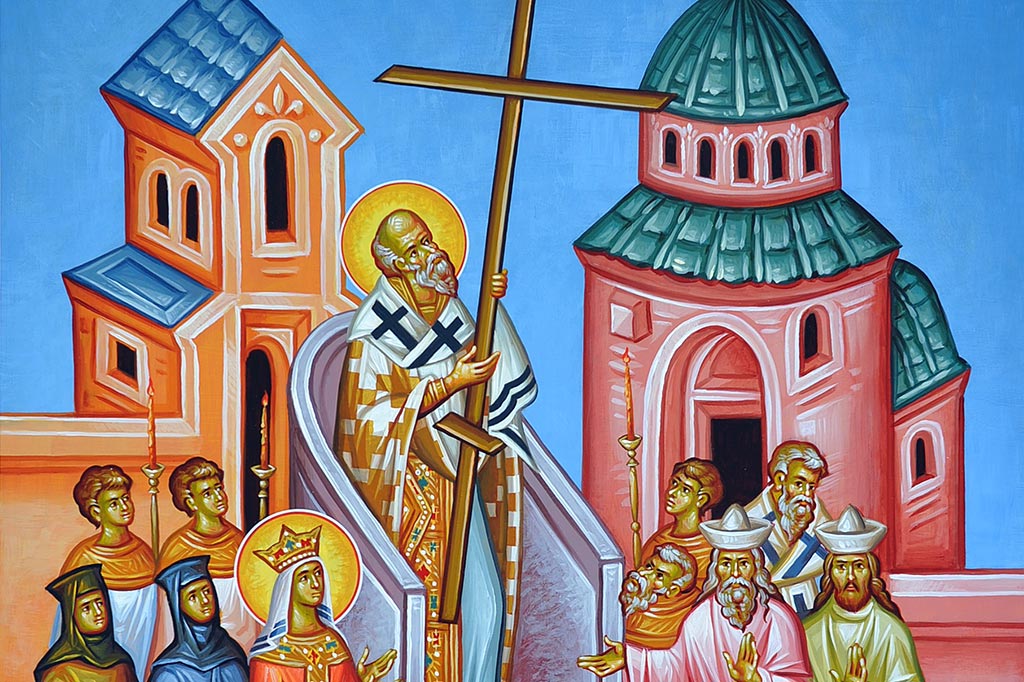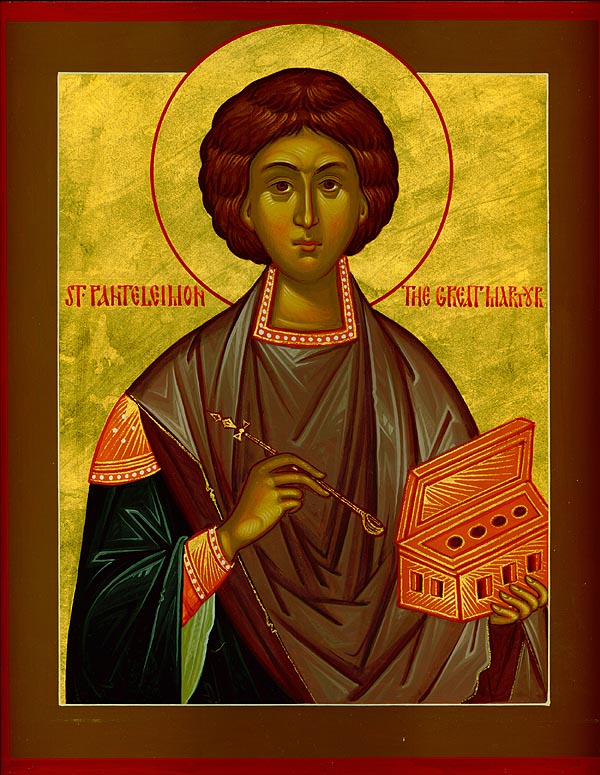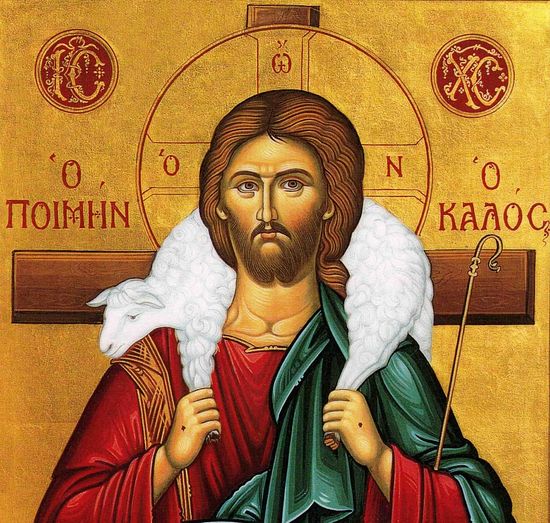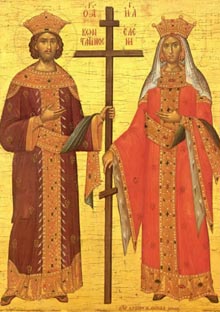Exaltation of the Cross
 September 14
September 14
Introduction
The Feast of the Universal Exaltation of the Precious and Life-Giving Cross is celebrated each year on September 14. The Feast commemorates the finding of the True Cross of our Lord and Savior Jesus Christ by Saint Helen, the mother of the Emperor Constantine.
Greatmartyr and Healer Panteleimon
 The Great Martyr and Healer Panteleimon was born in the city of Nicomedia into the family of the illustrious pagan Eustorgius, and he was named Pantoleon. His mother Saint Euboula (March 30) was a Christian. She wanted to raise her son in the Christian Faith, but she died when the future martyr was just a young child. His father sent Pantoleon to a pagan school, after which the young man studied medicine at Nicomedia under the renowned physician Euphrosynus. Pantoleon came to the attention of the emperor Maximian (284-305), who wished to appoint him as royal physician when he finished his schooling.
The Great Martyr and Healer Panteleimon was born in the city of Nicomedia into the family of the illustrious pagan Eustorgius, and he was named Pantoleon. His mother Saint Euboula (March 30) was a Christian. She wanted to raise her son in the Christian Faith, but she died when the future martyr was just a young child. His father sent Pantoleon to a pagan school, after which the young man studied medicine at Nicomedia under the renowned physician Euphrosynus. Pantoleon came to the attention of the emperor Maximian (284-305), who wished to appoint him as royal physician when he finished his schooling.
The hieromartyrs Hermolaus, Hermippus and Hermocrates, survivors of the massacre of 20,000 Christians in 303 (December 28), were living secretly in Nicomedia at that time. Saint Hermolaus saw Pantoleon time and again when he came to the house where they were hiding. Once, the priest invited the youth to the house and spoke about the Christian Faith. After this Pantoleon visited Saint Hermolaus every day.
An Orthodox Understanding of the Atonement
 How does the Eastern Orthodox Church view and articulate the atonement of our Lord? This question arises from many converts to the Eastern Orthodox Church, particularly here in America. Many come to the Eastern Orthodox Church looking to leave behind what they may consider harsh or even terrifying notions of God unleashing His wrath upon His Son on the cross. This can become strained when they then come to see the Orthodox Church, through Her fathers and hymnography, employ the same terms and verbiage as their former tradition. So, does the Eastern Orthodox Church thus employ a Penal Substitution model of the atonement?
How does the Eastern Orthodox Church view and articulate the atonement of our Lord? This question arises from many converts to the Eastern Orthodox Church, particularly here in America. Many come to the Eastern Orthodox Church looking to leave behind what they may consider harsh or even terrifying notions of God unleashing His wrath upon His Son on the cross. This can become strained when they then come to see the Orthodox Church, through Her fathers and hymnography, employ the same terms and verbiage as their former tradition. So, does the Eastern Orthodox Church thus employ a Penal Substitution model of the atonement?
St. Marina (Margaret), Great Martyr, of Antioch in Pisidia
![]() Commemorated on July 17
Commemorated on July 17
The Holy Great Martyr Marina was born in Asia Minor, in the city of Antioch of Pisidia (southern Asia Minor), into the family of a pagan priest. In infancy, she lost her mother, and her father gave her into the care of a nursemaid, who raised Marina in the Orthodox Faith. Upon learning that his daughter had become a Christian, her father disowned her. When she was fifteen years old, St. Marina was arrested and thrown in prison.
Governor Olymbrios was charmed when he saw the beautiful girl, and tried to persuade her to renounce the Christian Faith and become his wife. But Marina refused his offers. The governor became angry and ordered that Marina be tortured. She was fiercely beaten, then fastened to a board and her body torn with hooks. The governor hid his face, unable to witness her suffering. However, Marina refused to yield. Thrown again into prison, an angel appeared and healed her wounds. The next day, she was stripped and tied to a tree, then burned. Barely alive, she prayed: “Lord, You have granted me to go through fire for Your Name, grant me also to go through the water of holy Baptism.”
Feast of the Holy Great Sovereigns Constantine and Helen, Equal to the Apostles
 The Church calls St Constantine (306-337) “the Equal of the Apostles,” and historians call him “the Great.” He was the son o the Caesar Constantius Chlorus (305-306), who governed the lands of Gaul and Britain. His mother was St Helen, a Christian of humble birth.
The Church calls St Constantine (306-337) “the Equal of the Apostles,” and historians call him “the Great.” He was the son o the Caesar Constantius Chlorus (305-306), who governed the lands of Gaul and Britain. His mother was St Helen, a Christian of humble birth.
At this time the immense Roman Empire was divided into Western and Eastern halves, governed by two independent emperors and their corulers called “Caesars.” Constantius Chlorus was Caesar in the Western Roman Empire. St Constantine was born in 274, possibly at Nish in Serbia. In 294, Constantius divorced Helen in order to further his political ambition by marrying a woman of noble rank. After he became emperor, Constantine showed his mother great honor and respect, granting her the imperial title “Augusta.”

